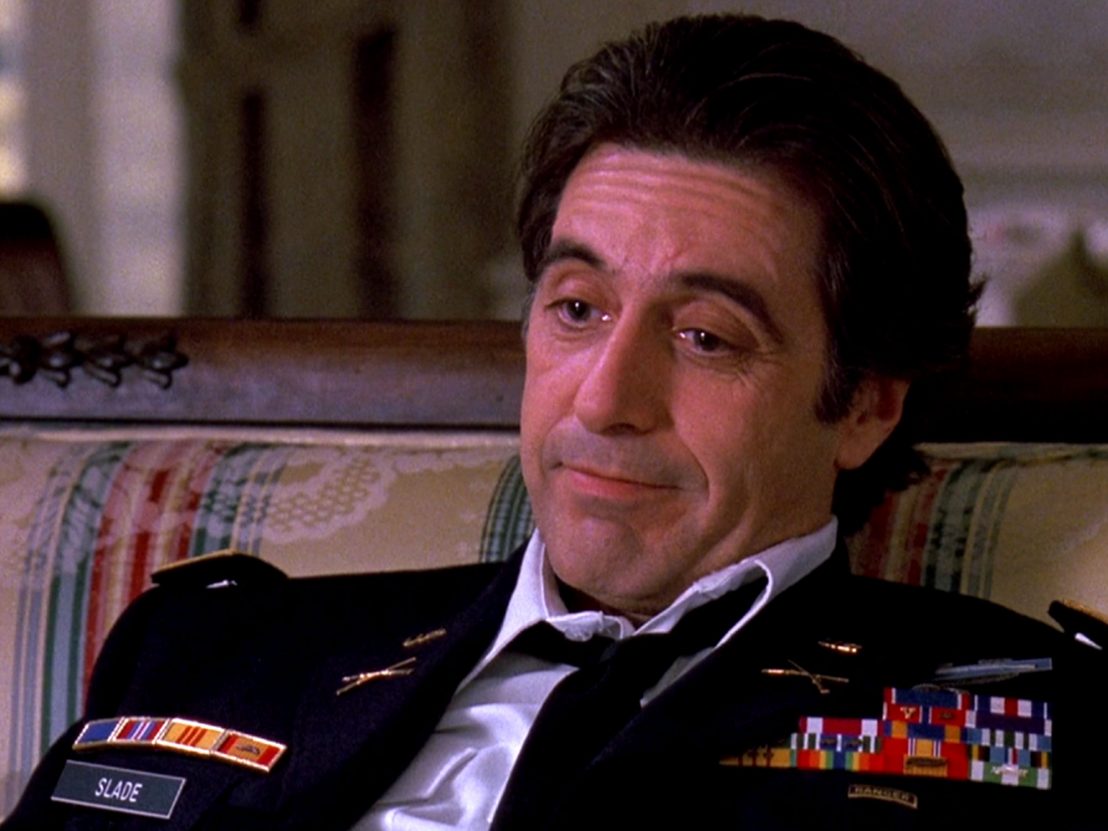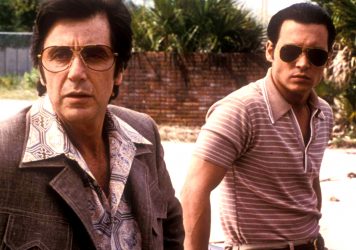
Conventional wisdom says that back in the 1970s Al Pacino was intense and internalised, and after that he became a hammy screamer, roaring in self-parody. Espousers of this view mockingly chortle “Hoo-ah!”, his catchphrase from Scent of a Woman, as their dismissive shorthand. “Integrity-of-a-madman monologues wrapped in ostentatious cosmetics,” is a description Karina Longworth has used for latter-day Pacino, and she’s a Pacino admirer. “Arm-waving, quiet-then-loud bluster,” says the critic Nick Schager. Frequently, Pacino skeptics will pine back to his subtly devastating work as the quietly corrupted Michael Corleone in The Godfather, and mourn the loss of the great Italian-American hope of naturalistic screen acting.
There’s some merit to this rendition of the actor’s trajectory, but it fudges and reduces a more appreciative view. Indeed older Pacino has been known to scream his way through a literal inferno, as in The Devil’s Advocate, while he did underplay so sensitively in The Godfather that executives at Paramount, who wanted him to come on strong, almost fired him. But the fully interior, brooding-soul performances are rarer than lore makes out, and have resulted in some of the actor’s least successful work.
They include Bobby Deerfield, in which Pacino plays a racing driver so silently dull it’s unclear what the nature of his internal conflict actually is, and Revolution, the historical epic that was rejected by reviewers and audiences as so garbled and flat that afterward Pacino took a four-year hiatus from film. Looking at Pacino’s lauded early work – from dramas as low-key as The Panic in Needle Park and Scarecrow, to dangerous thrillers like Dog Day Afternoon and Serpico – what is operating even then is not simply withdrawn subtlety, but an actor whose silences are seething with frustration, who jangles with nervous energy, and who occasionally boils over into shouting rage. “Attica! Attica!”
Martin Brest’s Scent of a Woman came during Pacino’s comeback phase in the early ’90s. Most of the 1980s had not been kind to him – whether he played small, as in Revolution, or large, as in Scarface, or in between, as in Cruising, he was critically mocked and commercially unstable. Then came Sea of Love, a formulaic but polished erotic thriller; Dick Tracy, with Pacino as mad gangster Big Boy Caprice; The Godfather: Part III, with its shambles of an ageing Corleone; and Frankie and Johnny, a low-key losers’ love story that reunited Pacino with his Scarface co-star Michelle Pfeiffer. These were hits, matching dependable genres with roles that dialogued with the actor’s wounded, washed-up circumstance. In Scent of a Woman, we got a role both clipped and large, a rage-against-the-dying-of-the-light tour de force where Pacino struggled to assert dominance while disabled.
As Lt Col Frank Slade, a former aide to Lyndon Johnson, now blind and confined to a granny shack in his niece’s suburban New England garden, Pacino slumps in an armchair nursing whisky and cigarillos, drawling to himself one minute and reviving his military bark the next. “I’ll wipe your nose in enlisted men’s crud!” he snaps at Charlie Simms, the prep school student played by Chris O’Donnell who has been roped into babysitting him over Thanksgiving weekend. But you can see Slade quiver and founder as he says it; it’s the grasping threat of a paper tiger.
Slade whisks Charlie to an unauthorised leave in New York City, where they stay at the Waldorf-Astoria and embark on “a tour of pleasures.” The colonel cackles one-liners and chugs down John Daniel’s. (“He may be Jack to you, son, but when you’ve known him as long as I have…”) He’s one of those drunks who presents as so incorrigibly offensive it transcends into a kind of charm (“There’s only two syllables in this whole world worth hearing – pus-sy”), and who nurtures a yearning, old-fashioned romanticism (“Have you ever buried your nose in a mountain of curls, and wanted to go to sleep forever?”)
Because Scent of a Woman is structured as a revue of last-chance adventures, Pacino gets to dance a tango, drive a Ferrari, flirt with a seamstress as she fits a spanking new suit, wax lyrical about the poetic eroticism of the high-class escort he meets offscreen, assemble a .45 as he threatens suicide, and deliver a barnburning final speech in defence of Charlie, who’s being threatened with expulsion from school for refusing to rat out a trio of vandal classmates.
It’s a smorgasbord of emotional notes and technical acting challenges. Pacino visited institutions for the blind, and trained himself to unfocus his eyes so he could perform as good as actually sightless (which led him to falling and incurring a genuine eye injury during production). Whereas in Profumo di donna, the 1974 Italian version of this material, Vittorio Gassman’s eyes were sternly fixed and crossed, Pacino’s eyes seem to softly gaze at a distant void, underscoring his wallow in defeat.
The iconic tango sequence – star-making for Gabrielle Anwar – is a rush not just for the stamina of the dance, or even the illusion it’s really a blind man doing it, but also the humble, trembling delight Pacino conveys – his face is frozen in a disbelieving grin as his body strains for expert moves; we sense his gratitude, respect and unworthiness for his beautiful, elegant young partner. Pacino gets to revel in the exercise of forgetting the sense of sight so that the others come alive – Slade’s head shakes and his nose chases scents up into the air, and like a magic trick, he deduces and barks the names of perfumes worn by nearby women. (“Fleurs de Rocaille! Flowers… from a book.”)
His slurring, then yapping, sometimes sing-songing voice, gets to both fester in quiet bitterness and roar into the wish-fulfilment of the rousing final monologue. (That famous “Hoo-ah!” is at first croaked in self-congratulation after savage put-downs, and finally employed as a breath of valediction from the satisfaction of acting selflessly.) Bo Goldman’s screenplay is an infinite stream of zingers, but it also gives Pacino the rare opportunity to show chops in comedy. (When Slade and Charlie are conning the Ferrari salesman into letting them take a test drive, Slade assures him, “My boy drives so smooth, you could boil an egg on the engine. When we bring the car back, I’ll peel the egg for you.”)
There’s no doubt this is showy, or that the redemptive, surrogate-father quality of the story parallels American cinema’s drift from the searching tragedies of the New Hollywood era that introduced Pacino to the reassuring fictions of the Reagan-Bush-I-love-you-dad years in which he found himself after his despondent sojourn. (“How’s that for cornball?”, Slade himself asks, as the schoolhouse cheers his closing statement.)
After seven previous nominations, Pacino finally won his Academy Award for this performance – not only was it regarded as a role designed to win awards, and a reward for former glory, but it’s one of the most derided Oscar-winning performances in movie history. “A male weepy with a size problem,” Manohla Dargis called the film in Village Voice. “This is little more than an entertaining show-off routine for Pacino, with little apparent intervention from the director,” opined Angie Errigo in Empire. Philip Strick in Sight & Sound called Slade “a gift of a part… it allows [Pacino] to be joker, orator, virtuoso, humanist and dirty old man” – but he didn’t mean it as a compliment.
Every time I watch Scent of a Woman, there’s a part of me that thinks I’ll mature into accepting the unconvinced critical consensus on it – that maybe it was just something I was worked over by as a kid. And every time, I find it deeply entertaining and moving. There’s a philosophical difference here, perhaps too fundamental to ever settle, between viewers who fetishise restraint and darkness as the apex of dramatic truth, and those who can embrace sentiment and maximalism. Sometimes you need a confection as a pick-me-up. Real emotion can be bound in a synthetic framework. In her book on Pacino, Longworth disapproves at how this movie represents the actor adrift in traditional work rather than the revolutionary political cinema studios were making in the ’70s; it’s a valid point, but I prefer to look at Slade as a meditation on trying to find a place for your rage in a world that wants to render it obsolete.
As to the largesse of Pacino’s performance, it’s important to remember he’s a Method actor, a descendant of teachers like Stella Adler, for whom “You have to develop size!” was a foundational principle. In one interview with his biographer, Pacino said, “There’s an old saying – ham is okay as long as it’s not Spam. When it’s really happening, when it’s energised and motivated by something real, it has size, it’s not over the top.” Pacino is not an extrovert on a personal level. “He’s shy, soft-spoken, tends to blush, spent much of his childhood contemplating the animals at the Bronx Zoo,” went one typical write-up in his early days. To think that his louder rages are phoned in is a fundamental misinterpretation of his art – for Pacino, the more livewire he gets, the more he has unconsciously released into emotionally engaging with his roles, and his career arc.
In Comic Strip Presents… The Strike, the brilliant 1988 satire that imagines a Hollywood bastardisation of the Arthur Scargill story, with Peter Richardson playing Pacino playing Scargill, the actor is described as a “mumbling ball of sexual tension from Brooklyn,” and he brags “This history-of-the-labour-movement speech – I can say all that just by the way I stand. You don’t need all that boring dialogue.” It also ends with a messianic soliloquy in the House of Commons, responded to with thunderous applause.
Scent of a Woman is an embodiment of both these poles, showing off Pacino’s intense training and his Hollywood milieu from their quietest to their most orchestral. A role like Slade is easy to mock, and easy to imitate, but difficult to create, encompassing genuine observations on loss and reaffirmation, and ultimately an example of how Pacino is able to express his energy. And if you wish Pacino kept doing quiet performances like Michael Corleone, perhaps you’re in the same position as Kay in The Godfather – wishing for the man to do something you like, but not understanding his journey, or his destiny.
Published 24 Jun 2017

The director’s much-maligned second feature is a vigorous piece of pulp for the 21st century.

Johnny Depp is on career-best form in Mike Newell’s classic crime-thriller from 1997.

This 1930s gangster classic set the blueprint for films like Goodfellas and The Departed.